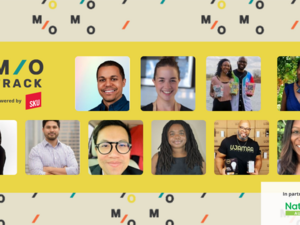
When you need help, one of the hardest things is to find it. Who to call? Where to look? How to start getting services?
This is where Aunt Bertha steps in. The Austin-based company, which operates findhelp.org, runs a referral network that lets people type in their ZIP codes and get connected with the type of help they may need.
Aunt Bertha is a certified B Corporation, which means it is required to consider the societal impact of its decisions, including its suppliers and its own workers and customers, and balance those effects with traditional profit motives. There are about 15 B Corps in Austin currently; others include Data.world, Vital Farms Inc. (Nasdaq: VITL) and NadaMoo.
Social services aren't traditionally associated with big money. But Aunt Bertha, founded in 2010 by CEO Erine Gray, has gained significant momentum, including serving more than 6 million users, and it has experienced additional growth driven by the Covid-19 pandemic, which forced many people to seek assistance.
The company raised $16 million in venture funding in 2019. On June 2 it announced it has raised an additional $27 million in a round led by New York City-based private equity firm Warburg Pincus. Several of the company's prior investors also added to the round. Those include Pershing Square Foundation, Techstars Ventures, Noro-Moseley Partners, Digitalis Ventures and The Social Entrepreneurs’ Fund.
It has now raised about $49.2 million total.
With the new money, Aunt Bertha plans to enhance its free and paid products and to expand its support for social workers and care coordinators. That includes a larger rollout of its marketplace, which offers social goods and services, such as transportation and food deliveries.
The company currently has 187 employees, about three-quarters of whom are based in Austin. It has aggressive hiring plans.
"We expect to grow by at least 100, probably more, over the next year," Gray said. "We're going to be heavily investing in our engineering team."
With the massive influx of new tech companies in Austin, many of them from Silicon Valley, hiring has become more competitive, especially for engineering roles, Gray said.
"Usually, our best employees are people who have maybe experienced the broken safety net at some point in their lives, whether they had a family member who was sick, or maybe they lost a loved one, or maybe they've seen their parents unemployed at some time earlier in their lives," he said. "And so, as a mission-driven company, what we try to offer is just that feeling you get on a Friday night, when you're driving home and just sort of knowing that you're helping people. It means that we have to work a little harder with recruiting, but so far we've done a pretty good job of finding folks like that."
Aunt Bertha has put an emphasis on developing a diverse team. Its website shows 51.5% of its staff identifies as female, and 38% identify as BIPOC, a group that includes Black, indigenous and people of color. It also shows more than 37% of leadership are BIPOC.
"We want to build an organization that represents America," Gray said. "It means we have to work harder. We have to rethink where we recruit from. It means that we have to just be a little bit more deliberate about how we recruit."
In addition to a growing engineering team, Gray said they hire for many entry-level positions for a data operations team that curates information for the company and its search engine. They often hire recent graduates and invest in training, promoting them up to developer and supervisor positions.
"I think the best way to really build a diverse leadership team is to promote from within," he said.
Aunt Bertha started as a public-facing search engine for anyone to find access to social services, ranging from food assistance to transportation. It was part of the Austin Technology Incubator, and later Capital Factory's accelerator.
Over time, it has expanded its mission and monetization strategies to include an offering for enterprise organizations, including large health plans, Medicaid managed car plans and hospital systems, including Ascension.
"Our customers are beginning to take that a little bit further, and they're basically starting to answer the question of, 'Well, what happens if there isn't capacity in a geographic region?'" he said.
For example, a 70-year-old in a rural community may not have transportation or access to Meals on Wheels.
"So what's happening is our customers are actually beginning to use our platform to essentially order services on behalf of the people they're serving," he said. "And we call that the marketplace. What's exciting is that the private sector is actually sort of holding hands, if you will, and coming up with creative ideas to help the people that they serve by actually just creating more capacity on the fly and hiring either nonprofits or other vendors to fulfill the needs of the patients that they care about."
As it evolves, Aunt Bertha is beginning to see more potential in its data to help drive public policy decisions and manage supply and demand. For example, the company's data shows how demand for many services spike when Covid-19 set in, and it shows how demand declined when stimulus checks began arriving. It can also see how states that provide dental care for adults on Medicaid have significantly lower demand for free dental services.
"Success means that in five years, or probably longer, policymakers, governors and just powers that be can look at this data and say where is supply of human services meeting demand on a county-by-county basis or even on a ZIP code-by-ZIP code basis. And where is supply not meeting demand," Gray said.
This story has been updated with additional info from Aunt Bertha CEO Erine Gray.







